Election
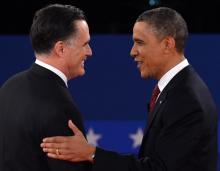
The presidential election is only weeks away… and it’s getting ugly out there. I mean … really ugly.
And before you think I’m just talking about the political process, the political parties, or the respective candidates, I was actually talking about you, me, us, and them … the people. And by people, I’m also especially talking about Christians.
Sometimes, I feel it would be appropriate to label how some Christians engage the presidential election season as “Christians Gone Wild."
Since there’s sure to be drama this week and next following the debates — and each day leading up to Election Day on Nov. 6, and likely some weeks afterward — I thought I’d share with you my 10 Commandments of the Election Season for Christians in hopes that it might speak some balance, sense, and perspective to any readers, not just during this election season but thereafter; not just in this country but in any country.
Why else am I sharing this?
Because I really want you to still respect yourself the morning after the election season.
Because I really want your friends to still respect you, too.
Know what I mean?
So, here are my 10 Commandments of the Election Season
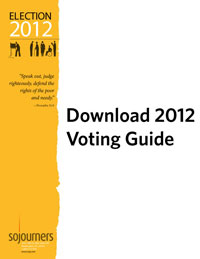 If you care about having a substantive conversation about issues that matter, you should share this post.
If you care about having a substantive conversation about issues that matter, you should share this post.
At its best, Christian faith provides a moral compass for advancing the common good. At worst, Christianity can be hijacked by partisan political agendas that divide and destroy. Sojourners encourages you to develop a robust and well-informed conscience around elections, measuring candidates and their platforms against Christian ethics and values. While we must be careful about translating scripture directly into public policy positions, there are principles and suggested approaches on a range of issues that can provide a critical framework to shape our perspective on public policy.
As we have since 2004, Sojourners has published an issues guide of principles and policies for Christian voters. We encourage you to use this guide to educate yourself on these issues. This can inform you as you write letters to candidates or to your local newspaper, call radio talk shows, and ask candidates at forums or town hall meetings questions based on these principles. Think and pray about whom, you would entrust with the responsibility to lead your community, state, and nation.
Share this with others and get ready for the conversation to begin.
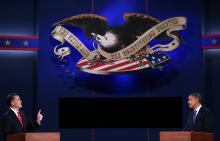
Last night millions of Americans watched the first Presidential debate of the 2012 election season. During the 90-minute debate, there were significant policy discussions about a range of issues, deep disagreements between the two candidates, and even a threat to Big Bird’s job security.
Yet despite all the arguing there was much left unsaid by President Barack Obama and Gov. Mitt Romney.
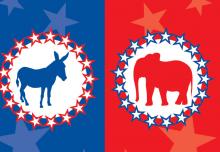
What if I told you that the political discourse in America has proven for decades what PSY’s ‘Gangnam Style’ phenomenon has proven recently? What do I mean? It is simply this: people can indeed get tirelessly excited about something that sounds good without understanding its contents.
Like every election year, 2012 seems to have its own particular set of buzzwords and slogans. From “the forgotten 47 percent” to “you did build that,” those on the left and the right are each trying to infuse the political discourse with their own partisan lingo. But it’s time somebody put a stop to the hype and asks the sensible question: “What is the real meaning behind all of this?”
Truth is, both political parties have been directing their resources to highlight their differences more than anything else. They are platforms defined by contrast, not by real facts. This should lead us to raise the question that is usually unasked (and therefore unanswered) amid the consistent heat of the American political climate: “If the government is designed ultimately for the good of the people, is the political discourse today reflective of that goal?”
To this question, the German philosopher Friedrich Nietzsche answers, “No.”
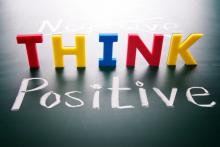
I’m a fan of TIME Magazine. It offers concise, intelligent summaries and opinions on the news that help keep me up with current events. They had an interesting article in the last few weeks about the factors that seem to affect a political party’s election results in the upcoming cycle. From their findings, it’s the party perceived to be most optimistic about the nation’s future that tends to come out on top. A fascinating bit of psychology, if not necessarily scientifically rigorous in its conclusions.
And then, in the most recent issue, there’s a pages-long piece by Bill Clinton called “The Case for Optimism,” which outlined five reasons to look ahead with hope toward our collective future. Coincidence? Maybe. But the timing of the two pieces, particularly only weeks out from a presidential election, seems more than a little bit opportunistic.
Call me cynical, but never let it be said that I’m above holding the Democrats’ feet to the fire when they pander. Yes, both parties do it, but it seems to me it’s most effective when it’s a little less in-your-face about it. President Obama rode a tide of optimism into the White House four years ago, only to watch his support erode after the reality didn’t live up to the speeches in many cases. But we wanted to hear it, and it worked. So it’s no surprise they’re giving it another go-round.
But are there grounds for such high hopes?
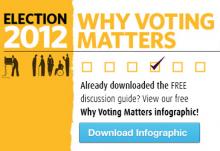
At its best, Christian faith provides a moral compass for advancing the common good. At worst, Christianity can be hijacked by partisan political agendas that divide and destroy. Sojourners encourages you to develop a robust and well-informed conscience around elections, measuring candidates and their platforms against Christian ethics and values. While we must be careful about translating scripture directly into public policy positions, there are principles and suggested approaches on a range of issues that can provide a critical framework to shape our perspective on public policy.
As we have since 2004, Sojourners has published an issues guide of principles and policies for Christian voters. We encourage you to use this guide to educate yourself on these issues. This can inform you as you write letters to candidates or to your local newspaper, call radio talk shows, and ask candidates at forums or town hall meetings questions based on these principles. Think and pray about whom, you would entrust with the responsibility to lead your community, state, and nation.
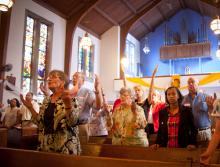
President Obama’s support among Catholic voters has surged since June, according to a new poll, despite a summer that included the Catholic bishops’ religious freedom campaign and the naming of Rep. Paul Ryan, a Catholic, as the GOP's vice-presidential candidate.
On June 17, Obama held a slight edge over Mitt Romney among Catholics (49-47 percent), according to the Pew Research Center. Since then, Obama has surged ahead, and now leads 54-39 percent, according to a Pew poll conducted on Sept. 16.
Among all registered voters, Obama leads Romney 51-42 percent, according to Pew.
Obama and Romney are essentially tied among white Catholics, which some pollsters call the ultimate swing group.
On Sept. 24 Romney unveiled his Catholics for Romney Coalition, which includes numerous politicians, beer magnate Pete Coors and Princeton University intellectual Robert P. George. The Obama campaign also has a Catholic coalition.
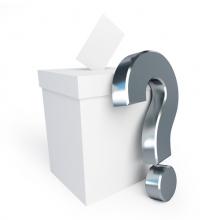
The white working class, a potentially rich bloc of voters for Republicans or Democrats, hasn’t settled on Mitt Romney or President Barack Obama, a new study from the Public Religion Research Institute shows.
“These white working class voters are not particularly enamored of either candidate,” said Daniel Cox, PRRI’s research director. “In terms of their favorability, they’re both under 50 percent.” Forty-four percent look favorably upon Obama and 45 percent upon Romney.
Released seven weeks before the election, the August survey found Romney with a double-digit lead over Obama among the white working class, which preferred the GOP candidate 48 to 35 percent.
But Cox points out that the gap narrows to statistical insignificance among women voters in this group, and in the Midwest and West, home of several swing states. The upshot for Romney and Obama?
If they want to woo this group, which makes up 36 percent of the nation according to the study, the campaigns may want to consider other findings of the PRRI poll.
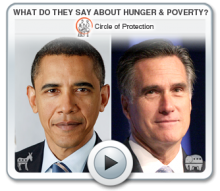
Christian leaders asked, and the presidential nominees answered. The poverty rate in America is still at a staggering 15 percent and 46.2 million Americans remain in poverty — what is your plan to address the problem?
The Circle of Protection, composed of Christian leaders from across the religious spectrum, released President Barack Obama's and GOP nominee Mitt Romney's video responses today at the National Press Club in Washington, D.C.
(VIDEOS from Obama and Romney after the jump.)
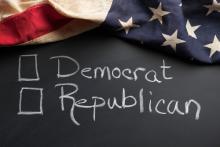
With the Republican and Democratic National Conventions having taken place over the last two weeks, we can officially say that we’re entering the election season (i.e., that time when the general public begins to pay attention).
A couple of friends who pastor churches in non-D.C. parts of the country asked me if we feel the need to address politics at The District Church, being in the very belly of the beast (my words, not theirs). Specifically, they were asking: Given the intense polarization and often-unproductive arguing that we see around us, even in the church, about the need to address how we interact with those who disagree with us.
So far, we haven’t needed to. In our church community, we have Republicans, Democrats, Independents, and yes, even people who don’t care about politics; we have Hill staffers, White House staffers, activists, advocates, lobbyists, policy wonks, and more — and we’ve all come together as the body of Christ, recognizing that our allegiance is first to Jesus before any party or even country.
Even so, every four years (or every two, if you pay attention to mid-terms; or all the time, if you’re even more politically engaged), posts about politics pop up with increasing frequency on social media, eliciting often-furious back-and-forths that usually end up doing nothing more than reminding each side how right they are and how stupid the other side is.
So I figured I’d try to offer a few suggestions on how we can engage with one another on matters of politics in healthy ways.

I’ll be honest … I’m a coward. During the political season I find myself avoiding certain conversations that I do care about. Mind you, I do have opinions. My wife would say I have an opinion on everything. Faith and social issues are extremely important to me, and I have spent a lot of years studying and following the trends and their impact on people I care a lot about. I am especially focused on issues that affect the poor, mentally ill, unemployed, addicted, and homeless. Topics of Medicare, unemployment benefits, the death penalty, gun control, abortion, gay marriage, state and federal budget and deficits, immigration, and foreign policy all matter to me. I do have opinions! (And I vote!)
Yet during the final months of America’s presidential street fight, I tend to lay low. I know that one simple conversation with almost anyone can turn volatile and unleash the beast within them. If educated congressmen, presidential candidates, governors, and even local representatives can be as nasty and polarized as they have publicly shown, there is little reason to honestly discuss an issue, since the potential for alienation and misrepresentation is at an all-time high. No one seems to be listening, having crystallized their presuppositions with a crafty skill of spinning any topic into their agenda. Ironically, our children are watching adult leaders model behavior we wouldn’t let them get away with.
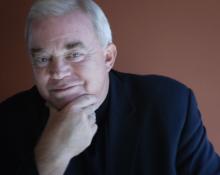
There is hardly a more controversial political battle in America today than that around the role of government. The ideological sides have lined up, and the arguments rage about the size of government: how big, how small should it be? Some famously have said government should be shrunk so small that it "could be drowned in a bathtub."
But I want to suggest that what size the government should be is the wrong question. A more useful discussion would be about the purposes of government and whether ours is fulfilling them. So let's look at what the Bible says.
The words of Paul in the 13th chapter of Romans are perhaps the most extensive teaching in the New Testament about the role and purposes of government. Paul says those purposes are twofold: to restrain evil by punishing evildoers and to serve peace and orderly conduct by rewarding good behavior. Civil authority is designed to be "God's servant for your good" (13:4). Today we might say "the common good" is to be the focus and goal of government.
So the purpose of government, according to Paul, is to protect and promote. Protect from the evil and promote the good, and we are even instructed to pay taxes for those purposes. So to disparage government per se — to see government as the central problem in society — is simply not a biblical position.
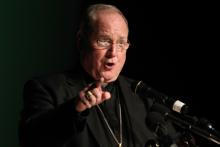
In a move that could recast the reigning political narrative about the Catholic bishops, Cardinal Timothy Dolan has accepted an invitation to deliver the closing benediction at the Democratic National Convention, a week after he gives a similar blessing to the Republicans in Tampa, Fla.
From the start, Dolan, who is also president of the U.S. Conference of Catholic Bishops, made it clear that he would be willing to pray at the Democratic convention. There were doubts, however, that the Democrats would invite Dolan.

Shrill voices, backed by vast ad spending, are trying to turn Americans against each other. And not just in vocal and behavioral disagreement, but to a depth of fear and hatred that could turn violent with little provocation.
Is it working?
To judge by the shrill echoes of shrill voices, the right wing is arming for battle, with God on their side, the flag as their shield, and the future of a white Christian nation at stake. Foolhardy politicians egg them on, and the greedy rich seem to believe that they can turn this hatred on and off to suit their quest for tax breaks.
Do the shrill represent any force larger than their own passions? Will the common-sense middle prove more durable and extensive than zealots want to believe?
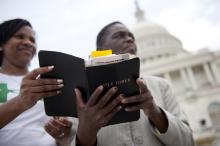
Learning to speak as a Christian is one of the most important and often ignored aspects of our discipleship. Nowhere is this fact more obvious than when churches try to talk about politics. When the small group leader makes a disparaging comment about Mitt Romney’s Mormon faith, or a car rolls into the church parking lot with a “NOBAMA” bumper sticker proudly displayed, what do we do?
Is bumper sticker propaganda and negativity the best we have to offer?
Admittedly it can be risky to talk about politics in the local church. All it takes is one idea or statement that flies in the face of someone’s deeply held convictions and that could be the end of our influence and the end of that person’s involvement in our ministry.
Still, the upcoming presidential election will be the defining cultural event of the next six months. If we completely ignore it we are missing a golden opportunity for discipleship.
How can churches have a healthy conversation about politics in the middle of a national election without demonizing the opposition and causing disunity?
I’ve been working on this question for months now, and as part of my preparation I wrote a book called Public Jesus. Here’s a little bit about what I’ve learned in the process:
1) Love the One You’re With
Matthew Hutson asks an interesting question in an article for The Huffington Post - Are Conservatives More Religious and Liberals More Spiritual?
"In the United States, religion and politics have always been (fitful) bed buddies. But whether faith drives people left or right (or neither) is not obvious. On one hand, there is the Christian right, a demographic epitomized by Jerry Falwell and Pat Robertson that values tradition and authority and opposes gay rights and the teaching of evolution. On the other hand, we owe many of our advancements in civil rights -- a predominantly left-wing cause -- to religious leaders such as Martin Luther King Jr. One way to make sense of the relationship between faith and political orientation is to recognize the difference between religiousness and spirituality."
Read the full piece here
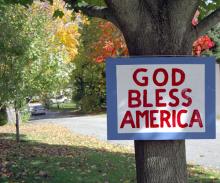
While liberals aren't as guilty of showmanship as conservatives (Keith Olbermann is the exception), they are as guilty of not taking politics seriously. Conservatives often resort to name-calling in the absence of debate, but liberals ignore whole categories of discussion. Like patriotism and religion. I suspect the reason is discomfort with talking about them, and I suspect that that's partly because they don't want to risk sounding like conservatives.
Well, it's time we got over that.
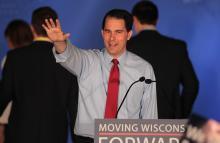
The votes are counted, the concession speeches made, the victory parties had. Wisconsin, a word that has become as synonymous with divisive politics as it is for cheese and beer, is done with the recalls.
In the end, some change was made. Between the first round of recalls and yesterday’s election, the senate has shifted from Republican to Democratic control. And yet, not much has changed. We still have a union-busting governor and a climate change doubter as lieutenant governor.
The calls, from politicians and citizens, have been pretty consistent. It is time to move forward. It is time to put aside our divisions and find a way to govern together. It is time of our state to heal.
Whatevs.
See, I’m not all that interested in moving forward – not because I like the fighting or because I think it is healthy to be so divided that the mere mention of politics in casual conversation makes blood pressures boil.

Mitt Romney clinched the GOP presidential nomination on May 28, becoming the first Mormon selected by a major political party. But will his barrier-breaking faith be a boon or bane to his White House campaign?
The answer to that question could presage the next president, and two studies published in May come to contradictory conclusions.
In both studies people were given information about Romney and his Church of Jesus Christ of Latter-day Saints, then asked whether they would be more or less likely to vote for him.
 In the Washington Post, Dana Milbank raises the question that has (apparently) been on everyone's lips during this election season:
In the Washington Post, Dana Milbank raises the question that has (apparently) been on everyone's lips during this election season:
Is Mitt Romney a unicorn?
An interesting question, we can all agree. By why are people asking?
According to Milbank:
The MittRomneyIsAUnicorn.com campaign came about because Arizona Secretary of State Ken Bennett, citing allegations that the birth certificate President Obama released is a fraud, threatened to take the incumbent off the ballot.
Another Post, writer, Alexandra Petri noted that, as many 18,000 people have signed on to a petition "demanding proof that Mitt Romney was not a unicorn", in light of the fact that "unicorns, as the petition pointed out, are ineligible for the presidency of the United States".
We will let you make up your own minds on this one folks...
P.S. Take a few seconds to check out the fantastic artwork that Petri employed to bring some clarity to the Mitt Romney/Unicorn claims. They are, in her own words "some of my best MS Paint work yet."